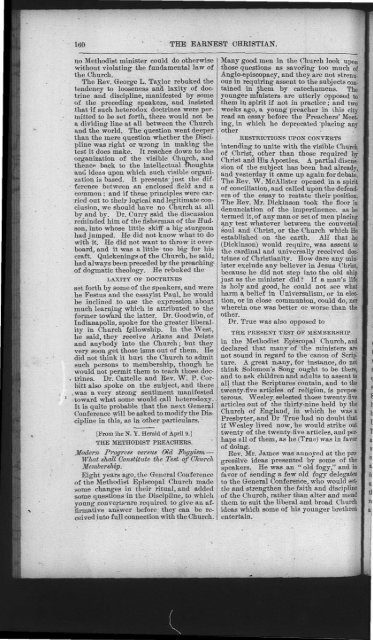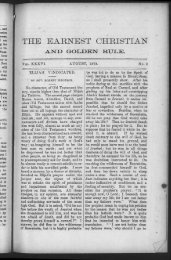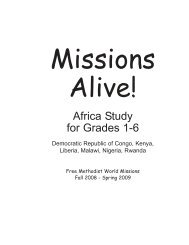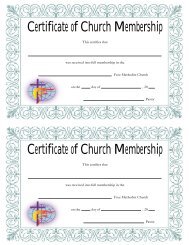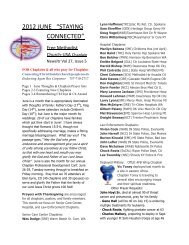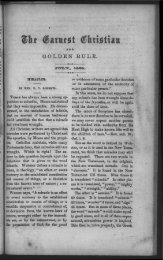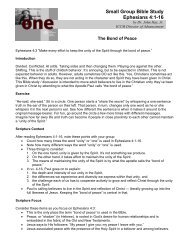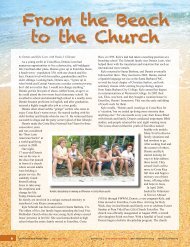Download PDF - Free Methodist Church
Download PDF - Free Methodist Church
Download PDF - Free Methodist Church
- No tags were found...
Create successful ePaper yourself
Turn your PDF publications into a flip-book with our unique Google optimized e-Paper software.
160 THE EABNEST CHRISTIAN.\'i1no <strong>Methodist</strong> minister could do otherwisewithout violating the fundamental law ofthe Ciiurch.The Bev. George L. Taylor rebuked thetendency to looseness and. laxity of doctrineand discipline, manifested by someof the preceding speakers, and insistedthat if such heterodox doctrines were permittedto be set fortli, there would not bea dividing line at all between the Ciiurchand the world. The question went deeperthan the mere question whether the Disciplinewas right or wrong in making thetest it does make. It reaches down to theorganization of the visible Cliujch, andthence back to the intellectual thoughtsand ideas upon which such visible organizationis based. It presents j ust the differencebetween an enclosed field and acommon ; and if these principles were carriedout to their logical and legitimate conclusion,we should have no <strong>Church</strong> at allby and by. Dr. Curry said the discussionreminded him of the fisherman of the Hudson,into whose little skifl' a big sturgeonliad jumped. He did not kuow what to dowith it. He did not want to throw it overboard,and it was a little too big for hiscraft. Quickenings of the <strong>Church</strong>, he said,had always been preceded by the preachingof dogmatic theology. He rebuked theL.'LXITY OF DOCTRINESset fortli by some of the speakers, and were, he Festus and the essayist Paul, he wouldbe inclined to use the expression aboutmuch learning which is attributed to theformer toward the latter. Dr. Goodwin, ofIndianapolis, spoke for the greater liberalityin <strong>Church</strong> fellowship. In the West,he said, they receive Arians and Deist.sand anybody into the <strong>Church</strong>; but theyvery soou get those isms out of tliem. Hedid not think it hurt the <strong>Church</strong> to admitsuch persons to membership, though hewould not permit them to teach those doctrines.Dr. Cattelle and Eev. W. P. Corbittalso spoke on the subject, and therewas a very strong sentiment manifestedtoward what some would call heterodoxy.It is quite probable that the next GeneralConference will be asked to modify the Disciplinein this, as in other particulars.[Prom ilie N. Y. Herald of April 9.]THE SIETHODIST PEEACHERS.Modern. Progress versus Old Fogyism —Wlint shall Constitute the I'est of <strong>Church</strong>Membership.Eight years ago, the General Conferenceof the <strong>Methodist</strong> Episcopal <strong>Church</strong> madesome changes in their ritual, and addedsome questions in the Discipline, to whichyoung converts'are required to give an affirmativeanswer before they can be receivedinto full connection with the <strong>Church</strong>.Many good men in the <strong>Church</strong> look uponthose questions as savoring too much ofAnglo-episcopacy, and they are not strenu.ous in requiring assent to the subjects containedin them by catechumens. Theyounger ministers are utterly opposed tothem in spirit if not in practice; and twoweeks ago, a young preacher in ihis cityread an essay before the Preachers' Meeting,in which he deprecated placing anyotherKESTRICTIONS UPON CONV^ERTSintending to unite with the visible <strong>Church</strong>of Christ, other than those required byChrist and His Apostles. A partial discussionof the subject has been had already,and yestei-day it came up again for debate.The Eev. W. McAlister opened in a spiritof conciliation, and called npon the defendersof the essay to restate their position.The Bev. Mr. Dickinson took the fioor indenunciation of the impertinence, us Letermed it,of any manor set of men placing^ny test whatever between the converted.soul and Christ, or the <strong>Church</strong> which Heestablished on the earth. AH' that he(Dickinson) would require, was assent tothe cardinal and universally received doctrinesof Christianity. How dare any ministerexclude any believer in Jesus Cbrist,because he did not step into the old shipjust as the minister did'? If a man's lifeis holy and good, he could not see whatliarni a belief in Universalism, or in election,or in close communion, could do, notwherein oue was better or worse than theother.Dr. True was also opposed toTHE PRESENT TEST OF MEMBERSHIPin the <strong>Methodist</strong> Episcopal Ciiurch, anddeclared that many of the ministers arenot sound in regard to the canon of Scripture.A great many, for instance, do notthink Solomon's Song ought to be there,and to ask children and adults to assent toall that the Scriptures contain, and to thetwenty-five articles of religion, is preposterous.Wesley, selected those twenty-fivearticles out of the thirty-nine held by the<strong>Church</strong> of England, in which he was aPresbyter, and Dr True had no doubt thatif Wesley lived now, he would strike oattwenty of the twenty-five articles, and perhapsall of them, as he (True) was in farorof doing.Bev. Mr. James was annoyed at the progressiveideas presented by some of thespeakers. He was an " old fogy," and infavor of sending a few old fogy delegatesto the General Conference, who would settleand strengthen the faith and disciplineof Uie Cburch, rather than alter and mendthem to suit the liberal and broad <strong>Church</strong>ideas which some of his youuger brethrenentertain.


